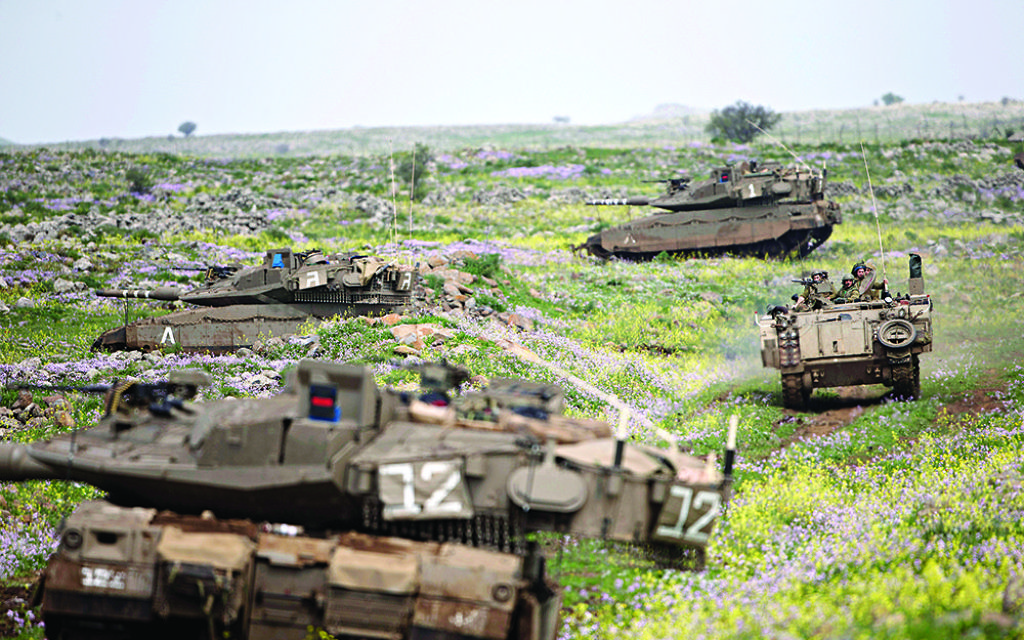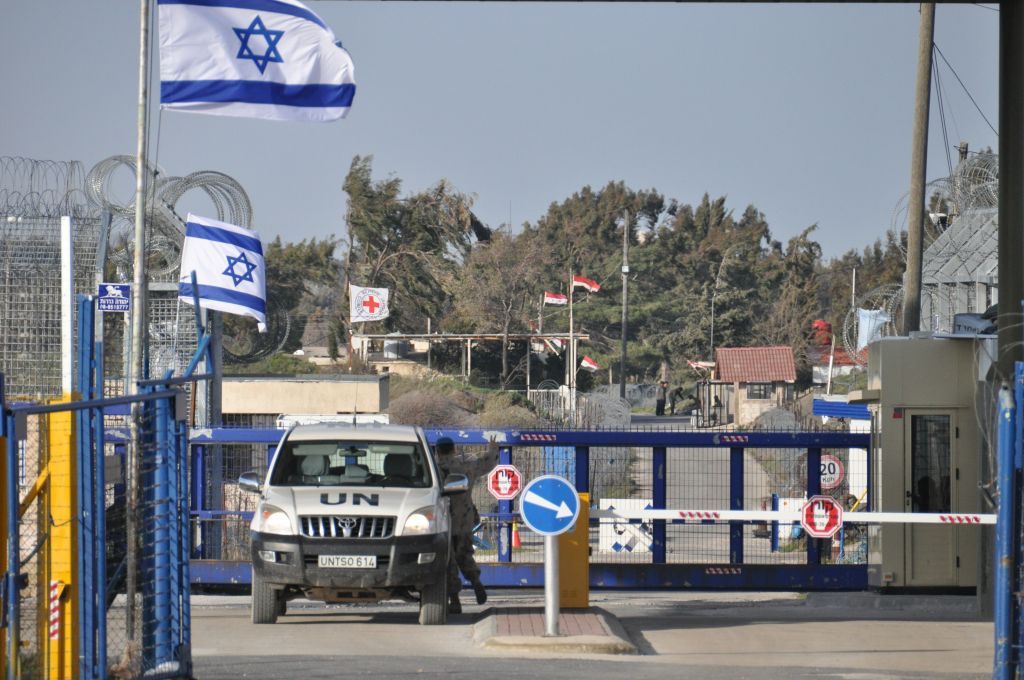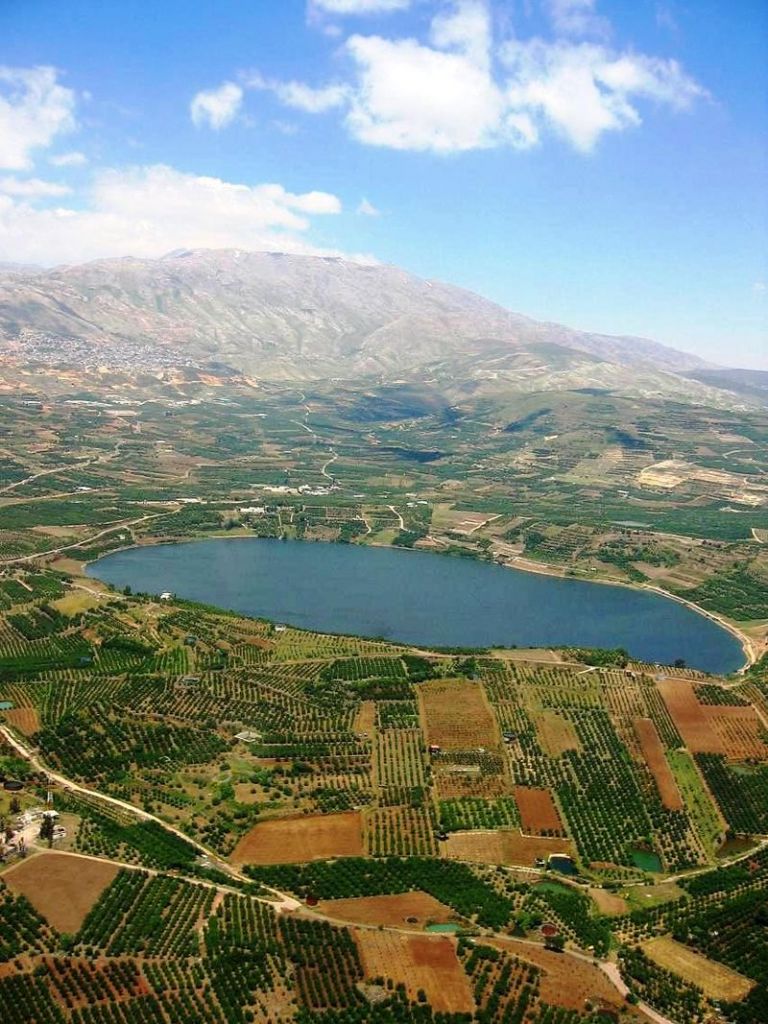A fragile silence on the Golan
As tanks stand guard in a field of wildflowers, Stephen Oryszczuk reports on ‘the chaos on Israel’s doorstep’
From the Dado Lookout in Israel’s uppermost north, Hezbollah’s proud new flag flutters its two fingers towards the Israeli village of Metula. But for the occasional crack of guns or deep rumble of tanks, the scene is placid and warm. The Lookout tops a ravine, carved by a stream heading east to Jordan. Two teenage love-birds sit cuddling, admiring the view.
Below, crops race up to international borders. Ahead, Lebanese trucks trundle up steep roads. Behind, Israeli surveillance antennae buzz and twitch from hilltops. In front, Shi’ite villages stare at Sunni and Christian neighbours nestled uncomfortably close.
This is a land of valleys, dips and vantage points, where sworn enemies live metres away. To the right, in the distance, the bare mountain spine of the Golan Heights darkens with Israel’s Sheba’a farms, sitting stoic and stubborn. Over the hill, Druze villagers cling to hills held by their forefathers, ever-weary of the black-flag jihadists eyeing it for themselves. Jew, Christian, Sunni, Shi’ite, Druze, all in the same spit of land. To those who live here, it is home. To others, it is the devil’s playground. He just hasn’t been around here much of late.
Get The Jewish News Daily Edition by email and never miss our top stories Free Sign Up
“We’ve had 10 years of silence,” says Maj. Sarit Zehavi, a recently retired IDF intelligence officer with a special interest in this region.
“It’s amazing. We’ll happily live with that. But you can tell it is a fragile silence.”
Hezbollah hides its weapons in the homes of those you see below you, she says. From her briefing, facilitated by BICOM, it’s clear that Israel has a healthy respect for its old enemy. “They know where to place the rockets. They know the ground.”
Might they have built tunnels? “Unlikely,” she says. The topography does the job for them. Two Israelis were kidnapped in a dip just below us, in part because “we just couldn’t see them”. To Zehavi and her intelligence colleagues, “Hezbollah is the professor, Hamas is the student”.
If this is a quest to learn the art of war, then to the east, along the Syrian border, al-Qaeda affiliates are the newest intake. Zehavi takes us to a bunker at Tel A-Saki, yards from the 1974 Ceasefire Lines, to see it for ourselves. Beneath our feet, a volcanic soil, rich in minerals, accounts for a series of hills formed by the African-Syrian Rift Valley.
Behind us, white 4×4 UN trucks pass by, armed with goodwill and symbolism. Doves among hawks, they seem ripe only for kidnappings and ransom, so it is no surprise to hear that they stay this side of the fence (there is no UNDOF corridor any more, despite what the maps say).
On the other side of the fence, right in front of us, a huge explosion kicks smoke, dust and rubble hundreds of feet up into the air. Who was it? Russians? Assad’s government forces? US-backed rebels? Jihadists? What was it? Airstrike? Suicide bombing? Car bomb? Mortar? Who were they after? Did they succeed?
As airborne remains drift slowly north, we’re left guessing. Minutes later, another; evidence if ever there was of the chaos on Israel’s doorstep.
Al-Qaeda affiliates Jabhat Al-Nusra “are active in every village here,” Zehavi says, “although they may not control every village they operate in.” Their black-flag rivals, Islamic State, who operate further along this stretch, have already threatened Israel, most recently in a video posted only two weeks earlier.
“We can’t ignore it,” she says. “It’s a totally different reality. Only two years ago, we had reserve forces up here, who had learnt to prepare for a column of tanks.
“Now we have regular forces. It’s all about intelligence. We can’t be indifferent to what’s going on.”
Neither can Israel be complacent, a lesson learned the hard way on this very spot in 1973, at the outbreak of the Yom Kippur War, when three lonely intelligence officers stationed here reported Syrian tanks approaching, just as Israeli generals in Tel Aviv were reassuring the public that war was “improbable”.
The force sent to rescue them was destroyed, overwhelmed by the “improbable” Syrian army entering Israel. It ended in victory, but not before many lives were lost.
Back at Northern Command, a (very) senior military source details, on a whiteboard, the assorted groups he now needs to know about.
There are Shia militias, secular Sunni rebels, religious nationalists, global jihadists, government forces, Christians, Druze, Alawites, thugs, mafias, defectors, all of them forcing the “cantonisation” of southern Syria, a border quiet for 40 years under successive Assad regimes, now fragmented.
In other areas of what-was-once Syria, the name of the game is to control refineries, dams, cities. Here, “the war is mostly about roads and roadblocks,” my source says, pointing out that the regime still holds most, including the Daraa-Damascus artery, but Al-Nusra need only take the Druze village of Hadar to open a 20-mile corridor along Israel’s border, giving access to Damascus routes.
Does the situation change day-by-day, or is it stabilising? “Violence in this region has tailed off in the past month,” he says. “We’re already starting to see an end. Stability is starting to arise, with pacts and treaties being signed. There are fewer fights now. Each side has decided for itself what it can gain, what it can hold.”
Will this steady quiet hold? “I don’t know,” he adds.” As long as they’re focused on themselves,” he adds, and not on Israel, “having a number of rebel groups on the border is a good thing”.

Thank you for helping to make Jewish News the leading source of news and opinion for the UK Jewish community. Today we're asking for your invaluable help to continue putting our community first in everything we do.
For as little as £5 a month you can help sustain the vital work we do in celebrating and standing up for Jewish life in Britain.
Jewish News holds our community together and keeps us connected. Like a synagogue, it’s where people turn to feel part of something bigger. It also proudly shows the rest of Britain the vibrancy and rich culture of modern Jewish life.
You can make a quick and easy one-off or monthly contribution of £5, £10, £20 or any other sum you’re comfortable with.
100% of your donation will help us continue celebrating our community, in all its dynamic diversity...
Engaging
Being a community platform means so much more than producing a newspaper and website. One of our proudest roles is media partnering with our invaluable charities to amplify the outstanding work they do to help us all.
Celebrating
There’s no shortage of oys in the world but Jewish News takes every opportunity to celebrate the joys too, through projects like Night of Heroes, 40 Under 40 and other compelling countdowns that make the community kvell with pride.
Pioneering
In the first collaboration between media outlets from different faiths, Jewish News worked with British Muslim TV and Church Times to produce a list of young activists leading the way on interfaith understanding.
Campaigning
Royal Mail issued a stamp honouring Holocaust hero Sir Nicholas Winton after a Jewish News campaign attracted more than 100,000 backers. Jewish Newsalso produces special editions of the paper highlighting pressing issues including mental health and Holocaust remembrance.
Easy access
In an age when news is readily accessible, Jewish News provides high-quality content free online and offline, removing any financial barriers to connecting people.
Voice of our community to wider society
The Jewish News team regularly appears on TV, radio and on the pages of the national press to comment on stories about the Jewish community. Easy access to the paper on the streets of London also means Jewish News provides an invaluable window into the community for the country at large.
We hope you agree all this is worth preserving.
-
By Brigit Grant
-
By Laurent Vaughan - Senior Associate (Bishop & Sewell Solicitors)
-
By Laurent Vaughan - Senior Associate (Bishop & Sewell Solicitors)
-
By Laurent Vaughan - Senior Associate (Bishop & Sewell Solicitors)
-
By Laurent Vaughan - Senior Associate (Bishop & Sewell Solicitors)
























